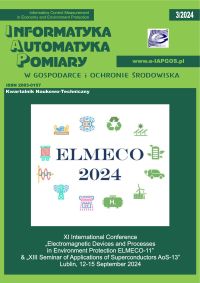TESTOWANIE WYSTĘPOWANIA STRUKTURY DANYCH W OPARCIU O PODEJŚCIE HYBRYDOWE
Volodymyr Mosorov
w.mosorow@kis.p.lodz.plLodz University of Technology, Institute of Applied Computer Science (Polska)
Taras Panskyi
Lodz University of Technology, Institute of Applied Computer Science (Polska)
Sebastian Biedron
Lodz University of Technology, Institute of Applied Computer Science (Polska)
Abstrakt
W pracy tej przedstawiono testowanie występowania struktury danych w oparciu o podejście hybrydowe. Podejście to, podczas testowania wymaga zdefiniowania hipotezy wstępnego klastrowania; założenia homogeniczności danych na podstawie zdefiniowanej „statystyki”; zastosowania tej samej procedury klastrowania dla interesującego zbioru danych oraz porównania wyników uzyskanych na podstawie statystyki z wynikami uzyskanymi z interesującego nas zbioru danych. Zalety i wady podejścia hybrydowego zostały również rozważone.
Słowa kluczowe:
hipoteza wstępnego klastrowania, testowanie struktury danych, występowania strukturyBibliografia
Mosorov V., Tomczak L.: Image texture defect detection method using fuzzy c-means clustering for visual inspection systems. Arabian Journal for Science and Engineering 39(4)/2014, 3013–3022 [DOI:10.1007/s13369-013-0920-7].
Google Scholar
Kumar D., Bezdek J.C., Rajasegarar S., Leckie C., Palaniswami M.: A visual-numeric approach to clustering and anomaly detection for trajectory data. The Visual Computer, December 2015 [DOI:10.1007/s00371-015-1192-x].
Google Scholar
Zhang S., Hu W., Wang T., Liu J., Zhang Y.: Speaker Clustering Aided by Visual Dialogue Analysis. Advances in Multimedia Information Processing – PCM 2008. Springer Science + Business Media. 693–702.
Google Scholar
Strauss D.J., Riverside C.: A model for clustering. Biometrika 62(2)/ 1975, 467–475 [DOI:10.1093/biomet/62.2.467].
Google Scholar
Bock H.H.: On some significance tests in cluster analysis. Journal of Classification 2(1)/1985, 77–108 [DOI:10.1007/bf01908065].
Google Scholar
Hartigan J.A., Mohanty S.: The runt test for multimodality. Journal of Classification 9(1)/1992, 63–70 [DOI:10.1007/bf02618468].
Google Scholar
Hennig C., Lin C-J.: Flexible parametric bootstrap for testing homogeneity against clustering and assessing the number of clusters. Statistics and Computing 25(4)/2015, 821–833 [DOI:10.1007/s11222-015-9566-5].
Google Scholar
Hautaniemi S., Edgren H., Vesanen P. et al.: A novel strategy for microarray quality control using Bayesian networks. Bioinformatics 19(16)/2003, 2031–2038 [DOI:10.1093/bioinformatics/btg275].
Google Scholar
Everitt B.S., Landau S., Leese M., Stahl D.: Cluster analysis. John Wiley & Sons, January 7, 2011.
Google Scholar
Gordon A.: Studies in Classification, Data Analysis, and Knowledge Organization. Gordon AD. From Data to Knowledge. Springer Science + Business Media 1996, 32–44.
Google Scholar
Fisher R.A.: The use of multiple measurements in taxonomic problems. Annals of Eugenics 7(2)/1936, 179–188 [DOI:10.1111/j.1469-1809.1936.tb02137.x].
Google Scholar
Gorman R.P., Sejnowski T.J.: Analysis of hidden units in a layered network trained to classify sonar targets. Neural Networks 1/1988, 75–89.
Google Scholar
Ripley B.D.: Neural networks and related methods for classification. Journal of the Royal Statistical Society - Series B (Methodological) 56(3)/1994, 409–456 [DOI:10.2307/2346118].
Google Scholar
Autorzy
Volodymyr Mosorovw.mosorow@kis.p.lodz.pl
Lodz University of Technology, Institute of Applied Computer Science Polska
Autorzy
Taras PanskyiLodz University of Technology, Institute of Applied Computer Science Polska
Autorzy
Sebastian BiedronLodz University of Technology, Institute of Applied Computer Science Polska
Statystyki
Abstract views: 241PDF downloads: 54
Licencja

Utwór dostępny jest na licencji Creative Commons Uznanie autorstwa – Na tych samych warunkach 4.0 Miedzynarodowe.
Inne teksty tego samego autora
- Fatma Mbarek, Volodymyr Mosorov, Rafał Wojciechowski, BADANIA REDUKCJI OPÓŹNIEŃ SERWERA WWW , Informatyka, Automatyka, Pomiary w Gospodarce i Ochronie Środowiska: Tom 7 Nr 3 (2017)








